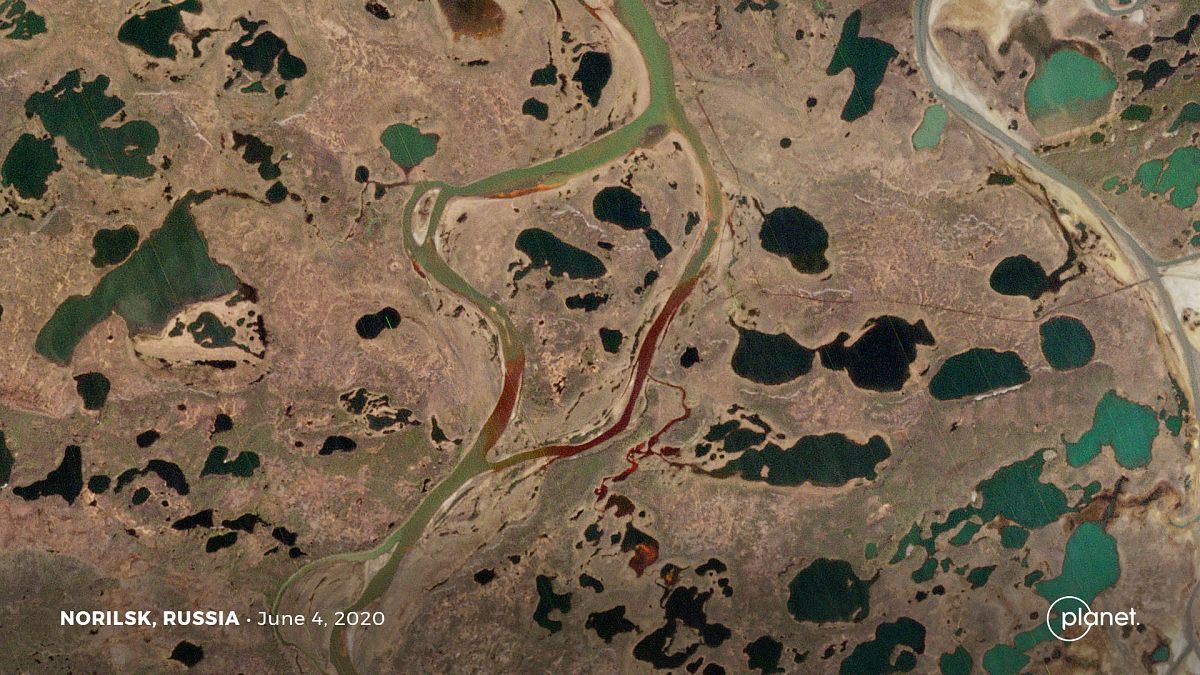More than 20,000 tonnes of diesel oil leaked into two rivers in Siberia, and now strong winds are hindering the clean-up operation.
Russian experts and environmentalists are battling to clean up a massive oil spill in Siberia, amid fears it could reach the Arctic Ocean.
President Vladimir Putin declared a state of emergency last week after more than 20,000 tonnes of diesel oil spilled into Arctic rivers.
Strong winds are now hampering the race to clean up the fuel leak near the city of Norilsk, though officials say a worst-case scenario has been avoided.
According to the Russian ministry of emergency, 3,000 cubic meters of diesel mixed with water have already been collected. But Aleksey Chupriyan, the first deputy emergency minister, said the northern wind was making things tricky for his teams.
"The spill is constantly migrating. Today we clean up the spot at one place, tomorrow at another one. We have to move constantly, and it means moving both people and equipment," he said.
A Russian environmentalist has warned that it could reach the Kara Sea, which forms part of the Arctic Ocean.
A senior inspector at the local branch of the state environmental agency told The Associated Press that he had noticed fuel traces on the banks of the Ambarnaya, which flows into Lake Pyasino before connecting with the Kara Sea.
The spill took place on May 29 at a power plant near the city of Norilsk, located in the Arctic Circle, 2,900 kilometres north-east of Moscow.
Oil leaked into two rivers: the Daldykan and the Ambarnaya which is located 12 kilometres away from the site of the spill.
Russian authorities have charged the director of the power plant with violating environmental regulations. Vyacheslav Starostin faces up to five years in prison.
An investigation is underway into the leak, which happened when one of the plant’s diesel storage tanks collapsed. Prosecutors say that melting permafrost likely caused the collapse.
Melting permafrost
The power plant is operated by a division of Norilsk Nickel, the world's largest producer of nickel and palladium.
Putin has criticised Norilsk Nickel, saying it took too long to notify the authorities of the leak. Environmentalists say it should also have better anticipated the risk posed by climate change.
Norilsk Nickel said in a statement that the "severe leak" was caused by the collapse of supports under a diesel storage tank. The company added that it notified authorities in a "timely and proper" manner
The Minister for Civil Defence, Emergencies and Natural Disaster Relief, Yevgeny Zinichev, said on Wednesday that it was only told of the leak on May 31.
"All this time, the company tried to localise the consequences of the spill on its own," he said.
The World Wildlife Fund (WWF) has called the accident the second largest in modern Russian history. Greenpeace compared it to the 1989 Exxon Valdez oil spill off the coast of Alaska.
Race against time
Aleksey Kniznikov, Oil and Gas Programme leader at WWF Russia, believes that just around a third of the leaked fuel can now be cleaned up.
"We are dealing with a spill of diesel fuel, and this type of oil product evaporates quite quickly. In just two weeks, everything that is not removed from the water will go into the air," he explained.
"Now rescuers tell us that the gas contamination is very high in the area of the spill, and that they have to work in gas masks. This proves that evaporation, even in the cold conditions of the Arctic, is happening very quickly."
Several rescue teams have been sent, including a group from the Ministry of Emergencies and another form the Maritime and River Transport Agency.
Booms to contain the oil have been secured and work is now underway to collect the oil and purify contaminated water and soil.
WWF Russia has warned that oil may have reached Lake Pyasino, located about 20 kilometres from the power plant, and that "successful spot localisation does not mean that no pollutants have not reached the lake".
"Alas, the most toxic components of diesel fuel are light aromatics (benzene, toluene, ethylbenzene and xylene), which in significant quantities will nevertheless dissolve in water and can in no way be collected by booms".
It also stressed that the spill could lead to "dire, catastrophic consequences" and threaten "the health and life of the local population" as well as "cause irreparable damage to ecosystems: fish, birds, animals die".
